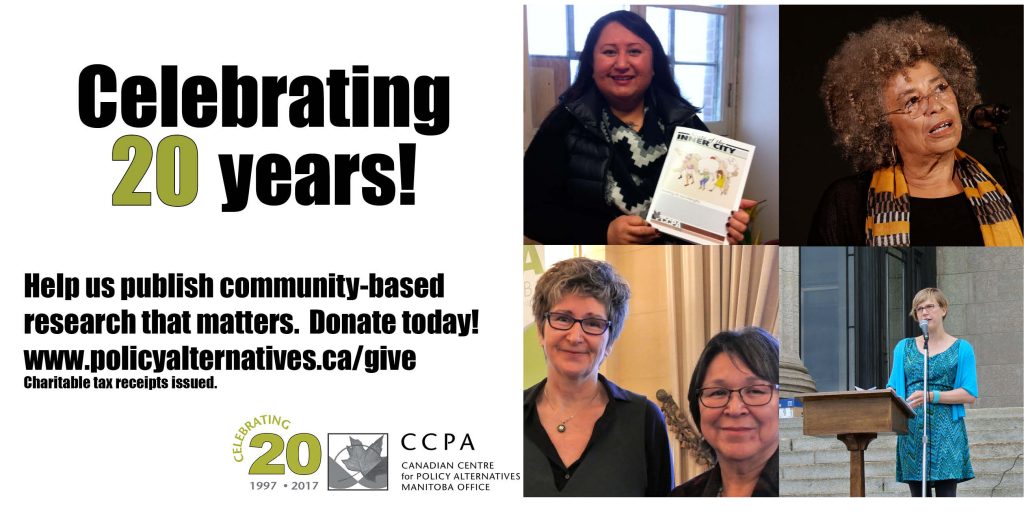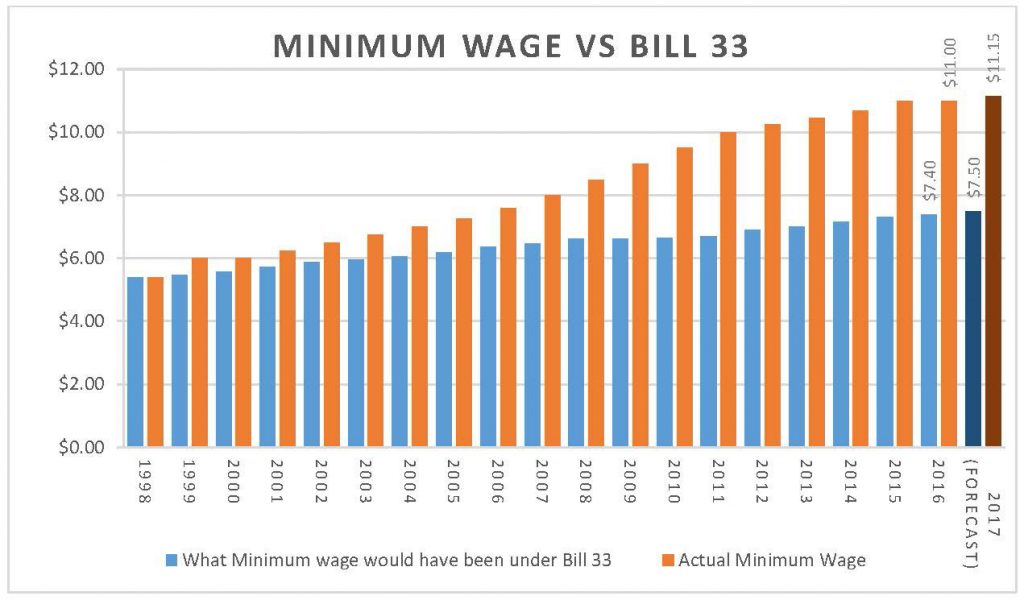By Shauna MacKinnon
On Friday May 26, I attended an impromptu event organized by supporters of the North Point Douglas Women’s Centre. The event was held to show support for the Centre, which was reeling from the news that it would not receive an expected $120,000 required for its operations. This represents one third of the Centre’s budget and losing it means that North Point Douglas Women’s Centre will be forced to cut important programs that are serving the community well. It got me thinking about reconciliation.
Indigenous women spoke passionately about the important role the Centre plays in their lives. They spoke about the culturally based programs that are helping them to heal from intergenerational trauma caused by government policies and programs like residential schools. As I listened to these women, it became clear that the Provincial government’s decision to cut funding for this and other community based programs serving high numbers of Indigenous peoples, is inconsistent with the Truth and Reconciliation Commission 94 Calls to Action and Manitoba’s Path to Reconciliation Act.
Premier Brian Pallister announced will be riding his bicycle from the St Peter’s Reserve (Selkirk) to Peguis First Nation this June 16 – 17 to recognize the 200th anniversary of the Selkirk Treaty. This blog summarizes the responses by Peguis First Nation member Tim Stevenson and CCPA Manitoba director Molly McCracken to the June bike tour.

This year the Manitoba office of the Canadian Centre for Policy Alternatives celebrates 20 years of independent research, analysis and expertise. From last year’s talk by Naomi Klein to this year’s address by black freedom movement icon Angela Davis, the Canadian Centre for Policy Alternatives (CCPA) Manitoba is at the forefront of progressive thought in our province.
20 years of CCPA Manitoba research and commentary is due to the dedicated support of individuals, organizations and unions. If you are a supporter, thank you. If you are not – please consider donating today to keep progressive ideas on the public policy agenda. WE NEED YOU! Big right wing think tanks are active in Manitoba – we struggle for space in the media against them all the time. Thanks to your support we can make sure we’re at every key policy discussion and decision, such as presenting on the regressive Bill 33, which entrenches minimum wage as a poverty wage; read our presentations and commentary.
The following is a sampling of what we’ve been able to accomplish thanks to the support of Manitobans concerned about evidence-based public policy to advance social, economic and environmental justice.
By Josh Brandon and Molly McCracken
Working should be a route out of poverty, but for some, low wages are a poverty trap. The current minimum wage is inadequate as at $11/ hour, it places workers as far as $8,000 below the poverty line. Minimum wage should be increased through pre-announced steps to $15.53/ hour and then indexed at that point. The current plan by the Manitoba government would tie minimum wage increases to the rate of inflation or less, freezing or lowering the buying power of the most vulnerable workers in Manitoba.

Under Bill 33, future minimum wage increases would be set at the rate of the consumer price index (CPI), or in the case of negative economic conditions such as a recession, no increase will be made. This legislation would give workers only a $0.15 increase in minimum wage in 2017.
Bill 33 Minimum Wage Indexation Act was heard by the Standing Committee on Social and Economic Development on May 23rd, 2017. CCPA Manitoba made two presentations to committee:
Comparing a living wage with minimum wage – Lynne Fernandez Errol Black Chair in Labour Issues
Adequate minimum wage is in public interest – Molly McCracken – Director CCPA-MB
By Lynne Fernandez
First published in the Winnipeg Free Press May 6, 2017
On May 2, 2017 the Province’s news release announced it would be putting out a request for proposals (RFP) for Public Private Partnerships (P3s) to build four new schools in Manitoba. The Premier claims that the P3 model has worked out well across Canada.

By Bronwyn-Dobchuck Land
On Saturday, May 6, 2017, Dr. Angela Y. Davis will deliver a talk in Winnipeg at Knox United Church titled Race, Resistance, and Revolution: Freedom is a Constant Struggle. She will be hosted by the Canadian Centre for Policy Alternatives Manitoba office, in partnership with Black Space Winnipeg and Queer People of Colour (QPOC) Winnipeg. While it is impossible to do justice to Dr. Davis’ contributions to politics, philosophy, and social movement organizing in a short summary, this CCPA Review highlights a few moments in her life and writing as examples of the span and scope of her work.
Dr. Davis has always been both a scholar and an activist, and a model for what it looks like to tie those two forms of work together. Her experiences – as a Black woman who grew up in the south, as a member of the Communist party, the Black Freedom Movement, and the Student Nonviolent Coordinating Committee (SNCC), as a graduate student of Philosophy, and as a political prisoner, to name a few – have shaped her theorizing, which has always been oriented toward explaining the world in order to change it.
by Lynne Fernandez
The government was well aware that many were dreading Budget 2017. Non-profit organizations, healthcare workers, educators and public sector workers in general were bracing for Filmon flashbacks. Did the Conservative team take those fears into consideration when putting together the budget?
By Molly McCracken
Social policy lowlights
Despite pundits’ claims that “its not as bad as it could be” there are a myriad of program cuts and tax cuts in this budget. As the weeks go by more impacts will invariably be felt in our community. Yet poverty and social inequality continue to grow and the climate crisis looms. Every year without investment in these critical areas is huge loss to all Manitobans.
This provincial government’s myopic focus on the debt and deficit fueled perceptions that this would be an austerity budget. Austerity is cutting services and public spending while also cutting taxes. While this is not austerity as seen in the European Union, the province reduced spending, services and taxes. The government could have moved faster to pay down the deficit by not reducing its revenues $34 million by indexing the basic personal exemption to inflation and indexing the tax brackets. This reveals the incongruity of this government’s policies.
Changes to Manitoba’s Health Care system are coming fast and furious. This will invariably impact key services we all rely on and limit access to needed services.
On April 7th, the Friday prior to the budget, the Winnipeg Regional Health Authority announced the closure of three Emergency Rooms (ER)s: Concordia, Victoria and Seven Oaks and the closure of the Misericordia Urgent Access Centre. Seven Oaks and Victoria’s ERs are slated to become Urgent Care Centres. The province directed the WRHA to reduce its budget by $83 million and this move will save $30 million. The closure of the three ER was recommended in the Provincial Clinical and Preventative Services Planning for Manitoba “Peachy Report” due to lower volume of emergency room visits in the ERs proposed to be closed.



Follow us!